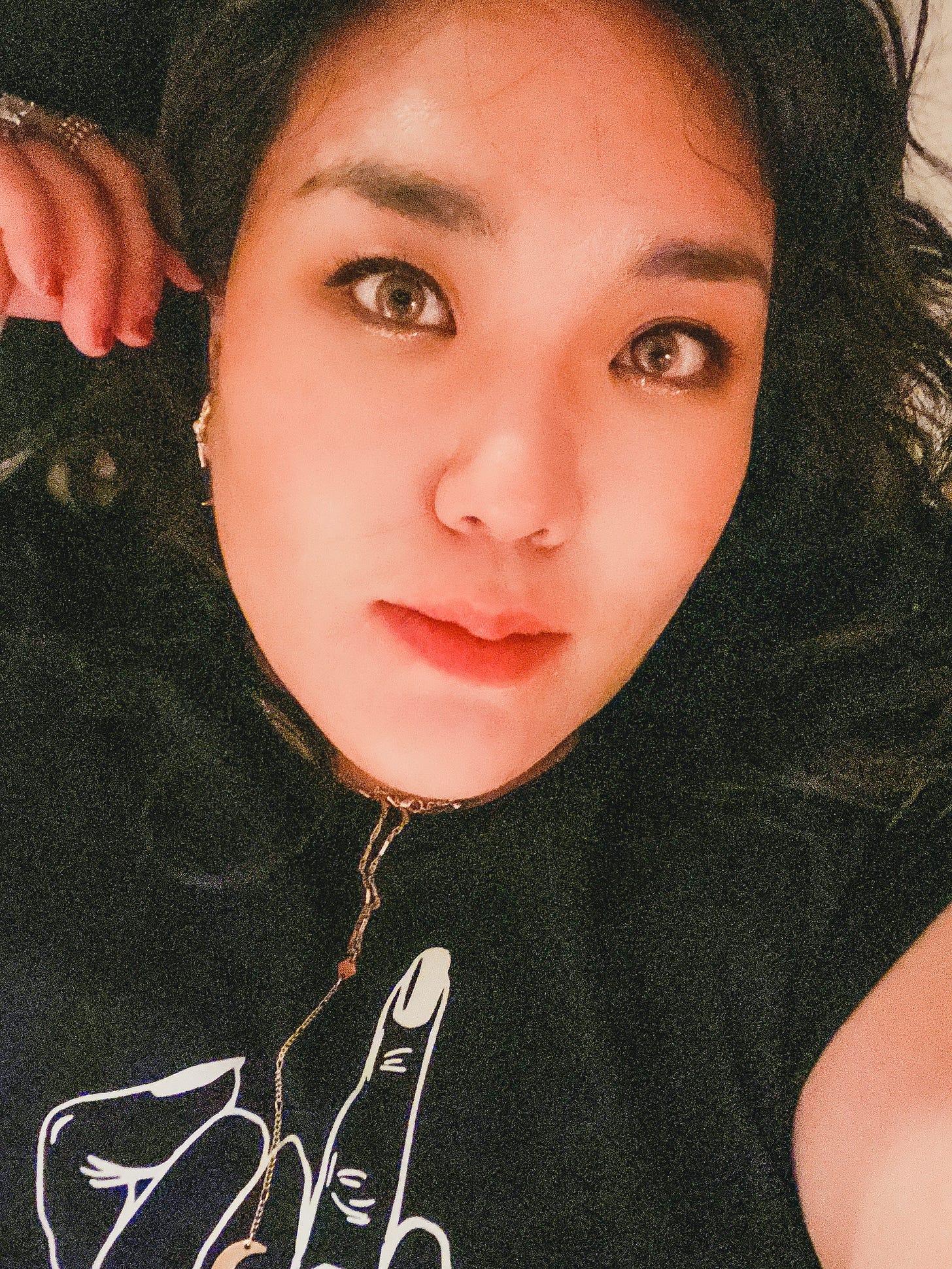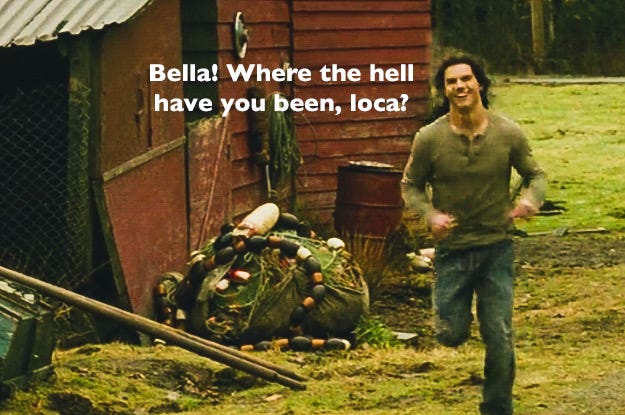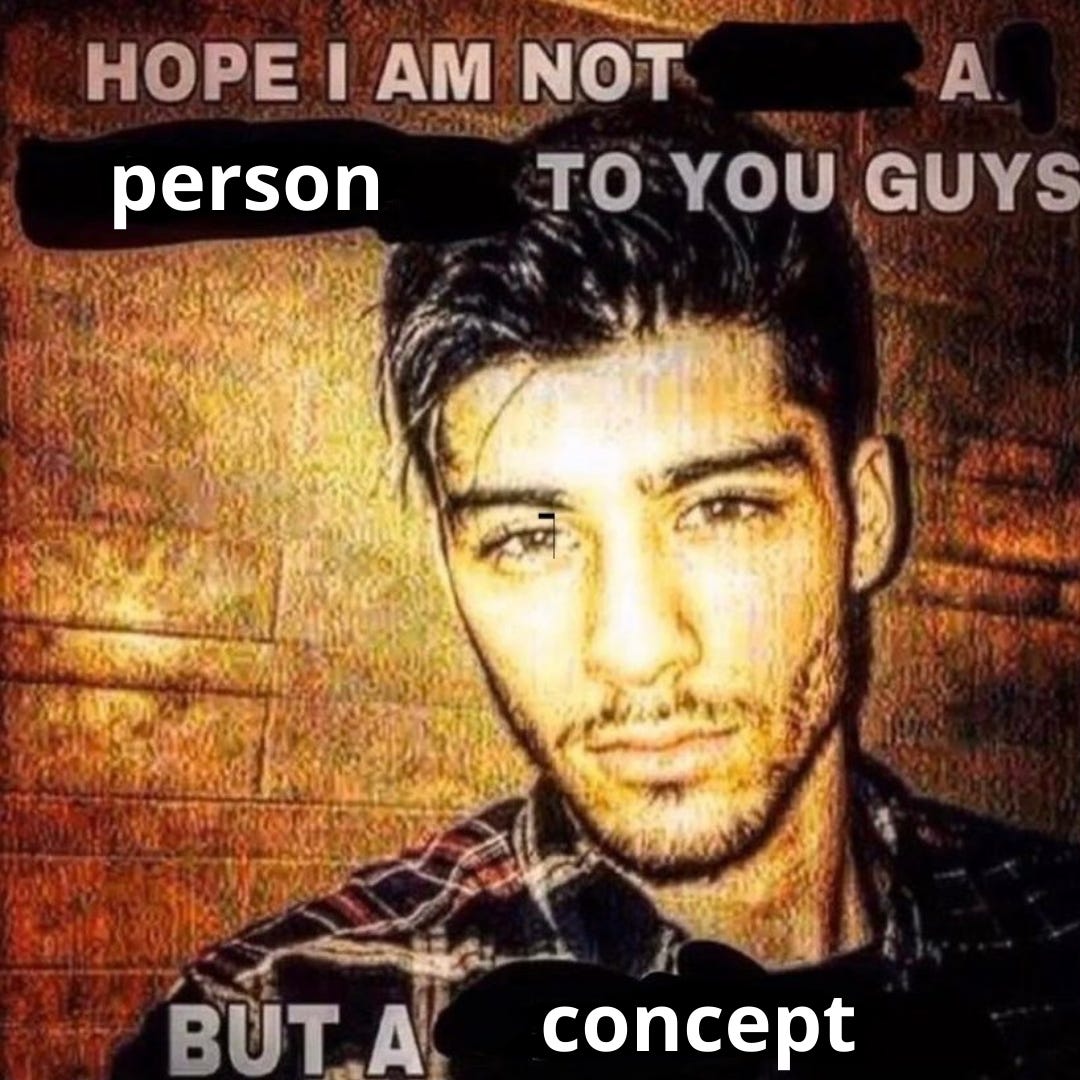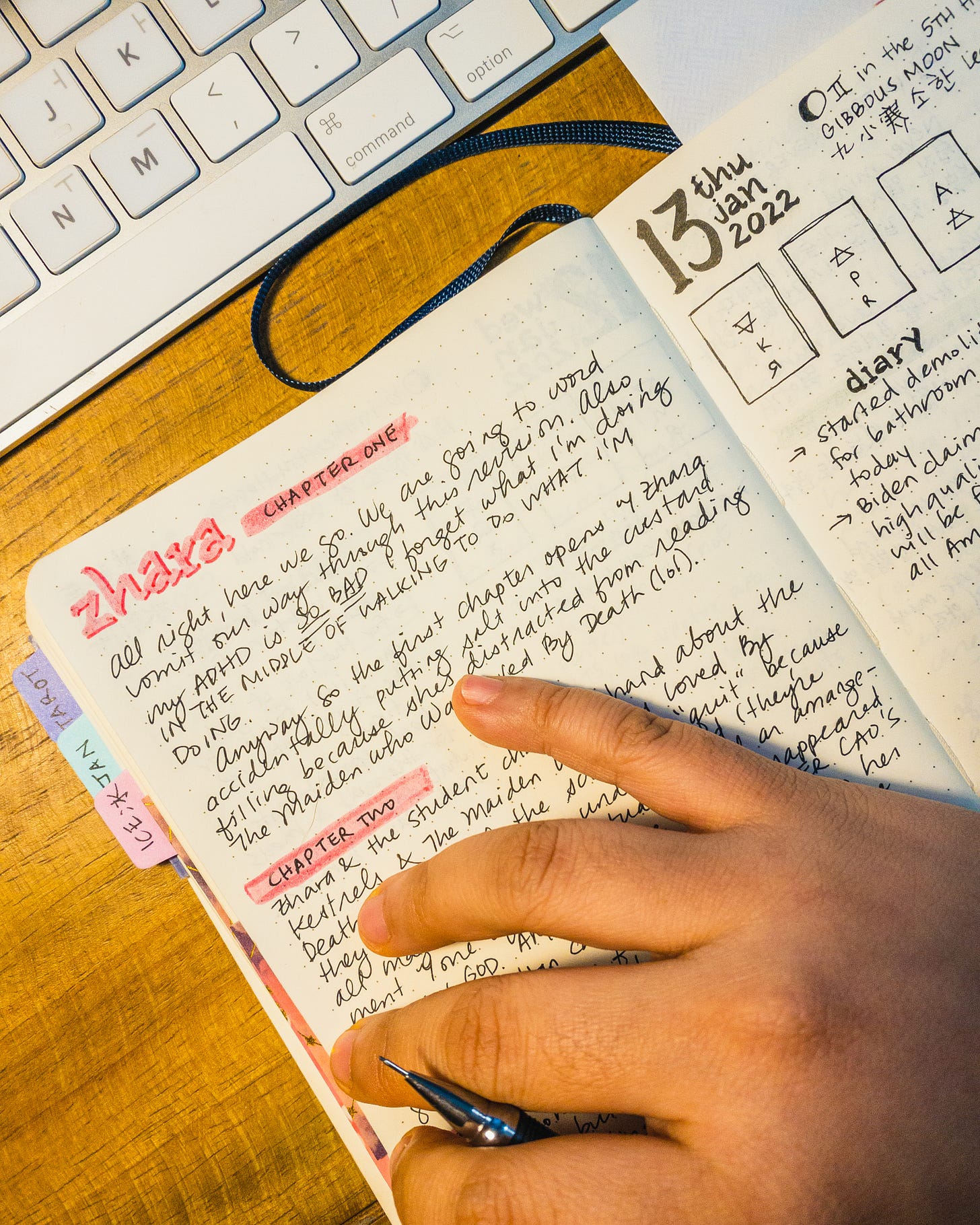Bella! Where the hell have you been, loca?
Absences, writers block, why I write, why I publish, and the necessity of joy in creation
안녕 친구들!~

On Tuesday, I turned in what I hope is the “final” (as final as things get in when you say you’re not a perfectionist but secretly are when it comes to writing) draft of the first Guardians of Dawn book.
And at last, I feel as though my long, dark winter is over.
I am, of course, being hyperbolic. I am a writer after all; I tend toward melodrama. And overwriting. And purple prose. Yet when I say it has been a difficult two — nay, three...no, four? — years, I am not exaggerating.
But first, the question I suppose I need to answer is Bella, where the hell have you been, loca?
Funny you mention hell, because that’s where I feel like I’ve been for the past five years. Ever since I became a published author. Ever since writing stopped being something I did for fun and something I had to do for work.
It’s strange being in the position of utterly loathing that which used to bring you joy. When I say strange, what I really mean horrifying, of course, but I do have a tendency to run away from the hard stuff. I hate pain. I am your classic enneagram Type 7 — pain avoidant. I am the Wizard Howl; I slither out whenever possible because I can’t stand being bored, or pinned down, or caught by expectations.
Choose a job you love and you'll never have to work a day in your life.
—A Capitalist
Being a published author ought to be a dream job. It is a dream job. But as that TikTok sound nobody seems to be able to source says, Darling, I’ve told you several times before: I have no dream job. I do not dream of labor.
I hate being an author.
I love being a writer.
And while there is considerable overlap between the two, they are not the same thing.
But I’m slithering out of answering the first question I posed myself, aren’t I.
JJ, where the hell have you been?

I have been struggling and struggling and struggling and struggling and struggling and struggling to write the first book in my contracted YA fantasy series, and finally turned in something that I am not only proud of, but genuinely like, on Tuesday.
That includes three years of missed deadlines, one massive mental health crisis that necessitated anti-psychotic meds, one preliminary ADHD diagnosis, two multi-state moves, the soul-crushing and devastating loss of my 할머니 (that wound is still too raw to touch), one jailhouse wedding, and oh, one giant fucking worldwide pandemic that is still ongoing.
When I write it out like that, it does seem like a lot.
But it doesn’t feel like it is.
My life, as it has always been, is charmed. I do not have to worry about basic needs like food or shelter, and most trauma rolls off me like water off the back of a duck. Or rather, I process trauma a bit differently from other people. I’m Aang from Avatar: The Last Airbender. He might have undergone the horrific genocide of his people, but also he would like some custard tarts, please. I am in constant motion, always moving, always running away from pain. I can only feel it for short bursts of time before I have to move on, to distract myself, before I am lost.
But I couldn’t do that with my book under contract.
I’m not the sort to be particularly precious about writing as Art™, but I find the act of commoditizing creativity difficult to overcome. Writing is one thing, but publishing is another. Writing is an art, publishing is a business, and trying to reconcile the two absolutely sullied what used to be something I did for pure pleasure. The thing about being a pain-avoidant sort of person is that pleasure is often the only thing that can get you through a day. I micro-dose on joy so I can cope with trauma, the way an alcoholic must drink in order to avoid delirium tremens.
I think for a lot of people, getting paid for your art is validation. Concrete manifestation of your worth as an artist, or at least valuation of the work you’ve produced. And shouldn’t we all be compensated for labor, no matter what the labor? That includes the hours spent in front of a computer, trying to fit the pieces of a story into the proper shape.
But for me, money comes with expectations.
And as I’ve said before, I hate expectations. I slither out of them in any way I can.
There is something of a contrary hobgoblin within me. You set an expectation before me, and I’m not going to deliver it the way you want me to. Like a gnome in the woods, all your contracts with me are going to be fulfilled in the strangest ways. Tricksy. That’s me, but not intentionally. Not always intentionally, at least.
I will admit to feeling especially contrary when it comes to the expectations placed around me as the author of Wintersong and Shadowsong. And they’re nothing onerous — or even real — I just bristle at their very idea, if not their actual existence. Such as the expectation that my next book will be sexy, or dark, or gothic, or lyrical (whatever that means).
Guardians of Dawn is none of those things.
A lot of my books are written from a sense of frivolous spite. While Shadowsong came from a very real, very honest, and very vulnerable place, I can’t deny that part of me delighted in the fact that I did not deliver the love story a lot of readers probably expected. I didn’t deliver it because that’s not what the story was about, not what I cared about, and not what I wanted to write about. Besides, why are they complaining? They got a happy ending, didn’t they? ㅋㅋㅋㅋㅋㅋ
But more than spite, most of my books are written from a place of joy.
For the first ten and a half years of my life, I was an only child, raised predominately by my 할머니, and mostly left to my own devices when it came to entertaining myself. Almost all of my childhood memories are of playing pretend with an entire cadre of stuffed animals, all of whom I had given very Victorian orphan-type names like Simon, Henrietta, and Dinah. I told myself stories because I didn’t have any other playmates, and eventually, I started writing them all down so I could pick up the narrative thread of pretend in the proper place the next day.
That sense of joy when I write is really a sense of play.
As I grew older, that sense of play expanded to include playing with other people’s creative properties in the form of fanfic, and then it grew to sharing my sense of play with my friends. I wrote to delight them as much as I did myself—writing them into Harry Potter fanfics, penning naughty doggerels about our teachers, bawdy lyrics about our inside jokes, and so much more.
I got so much joy from sharing in their delight. I got so much joy from writing. From playing.
I don’t get any joy from publishing.
And that’s why the last five years have been hell.
No, that’s not true.
There are moments of joy. When I meet a reader who tells me my book has meant a lot to them, when I see my friends and other bookish people at festivals and conferences, when I get to be seen. Sometimes it’s fun to strut and preen. I love playing dress-up; after all, I love to play.
In late 2021, an article made the rounds called Who is the Bad Art Friend? I’m less interested in the ethics of what makes a good or bad art friend than the conclusion that anyone in pursuit of publication is a narcissist. Myself included. I mean, here I am, sharing my thoughts with my subscribers like people are interested in what I have to say. Bad Art Friend did make me think about the reasons I share my work with people. I know why I write, but the real question is why do I publish?
If I’m completely honest, I’m not entirely sure I know the answer to that. It’s a question with which I’ve been grappling for the past five years.
The impulse to share is, I think, a deeply human one. But I don’t think the impulse to be paid is. I don’t much like cooking for myself, but I love cooking for other people. I love sharing something I’ve made with my own hands. I love sharing in their enjoyment of my labor. It’s not about the compliments; it’s about the connection.
When I first sold Guardians of Dawn back in 2018, what I wanted was to share with people was my love of the cultural tropes that shaped me as an Asian-American, like anime (especially Sailor Moon), as well as the feeling I got while playing the Dragon Age video games. It was the first time I had ever sold anything on proposal — not even a partial — but I had a pretty detailed synopsis of the first book. 2500 words, in fact.
None of it remains in the final draft. Except for the very basic premise — a Cinderella retelling.
It took me 12 drafts and over 700,000 words to get it right.
I think some of the struggle was because it was sold on proposal, before I had even properly fleshed out the story — especially the characters — in my head. Liesl just...showed up one day. She was vivid, so alive, so real that writing Wintersong felt like I was her amanuensis. I didn’t have to do any work because she just sprang fully formed from my head like Athena from the head of Zeus.
The main character of Guardians of Dawn was not like that.
In fact, the main character of the first book felt completely lifeless to me for the first, oh...seven drafts or so? Rote, going through motions, technically “right,” but without that spark which makes a character breathe. I was a god playing with clay golems, but none of them were coming to life.
The other part of the struggle was writing for money.
These days I find myself thinking a lot about value and worth, and wondering if we can divorce these concepts from capitalism. From the concepts of cost and market and labor and compensation. The price of...anything...is theoretically calculated via handwave-y math that “tries” to take into account the cost of materials, labor, distribution, et al and balances that against a perceived “market value.” For practical, tangible products, this calculation is perhaps a bit more straightforward than say...a book or a movie. Calculating worth from intellectual property is...fraught. For physical property, money is representative of value. This piece of land costs whatever price the seller and buyer have agreed upon based on location, yield, etc.
For intellectual property, money is validation.
The difference is slight but ever-so-significant.
Money has never been validation for me. I know, I know, what a privileged thing to say — and yes, I’ve grown up relatively privileged — but it’s the truth. Money is not validation; money is obligation.
And as you might expect, the troll in me hates any sort of obligation.
But more than that; obligation is the opposite of sharing. The fact that I was writing something because I was obligated to felt like the complete antithesis to writing for fun, even though I wanted to write this book. I wanted to so, so much.
I kept running into the same question again and again during the writing of the first Guardians of Dawn: why am I doing this? As in, why am I in publishing? I could sense the bars of my cage of expectations (likely just imagined but still very real in my head) closing in around me, and resented everything. I resented posting anything related to my books on social media. I resented opening my laptop and staring at the blinking cursor on my screen. I resented being a public(ish) figure. I resented that I was perceived by people I did not know. I even resented their admiration of me. I wanted nothing more than to disappear into a puff of smoke, off to the fairy realm where I’m from, where I belong.
Some of my resentment resolved itself with the proper medication for my bipolar disorder. But the question remained unanswered.
Why do I publish?
To be honest, I still don’t know.
Little by little, joy returned.
A lot of that was definitely due to proper medication, but some of it was just...not giving a fuck any more whether or not I was published.
Ironically, not caring made me care.
But I suppose that’s the contrary little hobgoblin in me.
I don’t take much — if anything — seriously. Some might call it a character flaw, but whatever it is, it’s certainly a character trait of mine I can’t just rewrite in revisions. I care, and often very, very deeply, but I am bad at expressing it earnestly. Roshani Chokshi teases me and says that I can’t tell her that I love her while looking directly at her. It’s true; earnest emotion makes me itch. If I can brush it off, make light of it somehow, I will. But just because I make light of something doesn’t mean I am not sincere. I just keep dancing, keep dodging, keep avoiding pain.
I am the gnome in the woods, the Wizard Howl, Aang.
I am, also, funny.1
I stopped caring about whether or not Guardians of Dawn was a “natural” successor for my other work. I stopped caring about all aspects of commodification — branding, strategy, marketing. I stopped caring that this book was tonally different; in fact, I wanted it to be. I was so sick of reading books full of earnest emotion. I bad at it — both the reading and writing thereof.
So I stopped giving a fuck and started having fun.
I started putting in little references and jokes to myself of all the things I loved and that inspired me. Dragon Age. BTS. (They make a pretty big cameo.) Himbos. Even Wintersong makes an appearance as a trashy romance novel the main characters bond over. For all that I am bad with earnest emotion, the only thing I can earnestly express is joy. I am, at my heart, a fangirl. These inside jokes are little love notes to you, dear reader, like the writing gifts I used to leave for my friends in their binders and backpacks in high school. I hope they delight you as much as they delighted me.
But if they don’t, ah, well, I’ve stopped giving a fuck anyway.
Anyway, that’s all for this time. I did want to talk bit about why there is such a long gap between my books and really only got to half of it—the emotional and mental part. The other, maybe more interesting part, is probably craft. 700,000 words over 12 drafts, 친구들. For a very long time, I genuinely thought maybe I was broken, that I had somehow tricked myself into thinking I could string two words together. Because my god, everything was crap. Crap, all crap! But that’s the subject for another newsletter.
사랑해,
JJ
DON’T TELL ME IF YOU DON’T FIND ME FUNNY. I’M PAIN AVOIDANT, REMEMBER?







I relate SO MUCH TO ALL OF THIS!!!